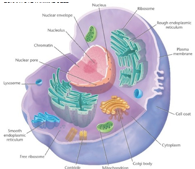![]()
![]()
![]()
Use LEFT and RIGHT arrow keys to navigate between flashcards;
Use UP and DOWN arrow keys to flip the card;
H to show hint;
A reads text to speech;
17 Cards in this Set
- Front
- Back
|
What is a cell? |
the smallest unit that can perform all the processes necessary for life. |
|
|
Which scientist said discovered that all cells come from other cells? |
Rudolf Virchow |
|
|
No one knew about cells until the invention of what piece of scientific equipment? |
Microscope |
|
|
Which scientist made his own microscopes and found tiny cells swimming in pond water, which he called “animalcules” since they looked like small animals swimming around? |
Anton van Leeuwenhoek |
|
|
What are the three parts of the Cell Theory? |
• All organisms are made of one or more cells • All cells come from existing cells |
|
|
Why do cells need to be so small? |
So they can take in food easily and get rid of waste out |
|
|
What are the two basic types of cells? |
prokaryotic and eukaryotic |
|
|
Which scientist discovered and named cells? |
Robert Hooke |
|
|
What is the main difference between prokaryotic and eukaryotic cells? |
prokaryotic cells don’t have a nucleus and eukaryotic do have a nucleus. |
|
|
What are the two types of eukaryotic cells we have studied? |
Animal and plant |
|
|
What are the small, specialized structures within cells that have a specific function? |
Organelles |
|

The cell below is a(n) |
prokaryotic cell |
|

The cell below is a(n) |
eukaryotic: animal cell |
|
|
The cell below is a(n) |
eukaryotic: plant cell
|
|
|
Nucleus: |
control center of the cell and contains the cell’s DNA. |
|
|
Ribosomes: |
Made of RNA and protein, these are the sight of protein synthesis. |
|
|
Lysosomes: |
Organelles that contain digestive enzymes that destroy waste materials |

